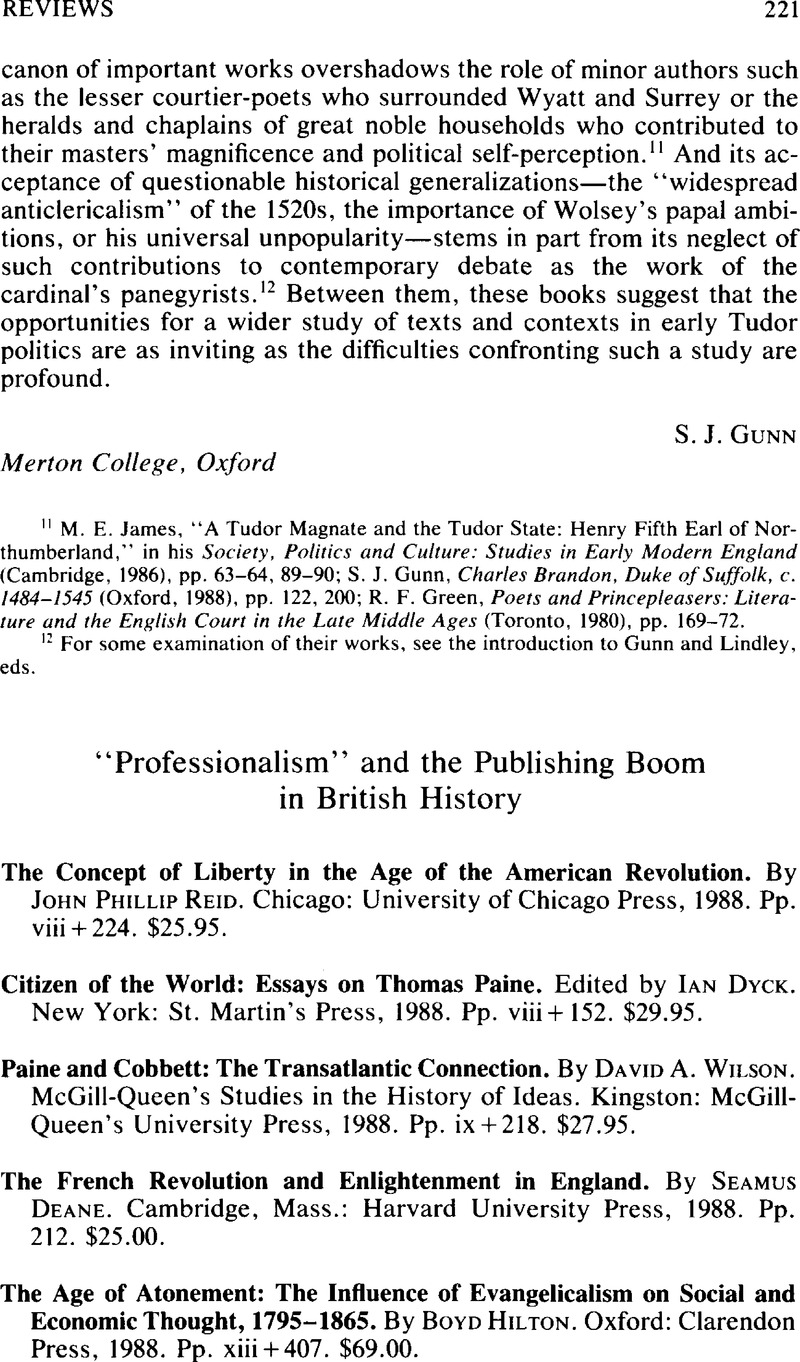No CrossRef data available.
Article contents
“Professionalism” and the Publishing Boom in British History - The Concept of Liberty in the Age of the American Revolution. By John Phillip Reid. Chicago: University of Chicago Press, 1988. Pp. viii + 224. $25.95. - Citizen of the World: Essays on Thomas Paine. Edited by Ian Dyck. New York: St. Martin's Press, 1988. Pp. viii + 152. $29.95. - Paine and Cobbett: The Transatlantic Connection. By David A. Wilson. McGill-Queen's Studies in the History of Ideas. Kingston: McGill-Queen's University Press, 1988. Pp. ix + 218. $27.95. - The French Revolution and Enlightenment in England. By Seamus Deane. Cambridge, Mass.: Harvard University Press, 1988. Pp. 212. $25.00. - The Age of Atonement: The Influence of Evangelicalism on Social and Economic Thought, 1795–1865. By Boyd Hilton. Oxford: Clarendon Press, 1988. Pp. xiii + 407. $69.00.
Published online by Cambridge University Press: 10 January 2014
Abstract

- Type
- Reviews
- Information
- Copyright
- Copyright © North American Conference of British Studies 1991
References
1 Cannadine, David, “British History: Past, Present—and Future?” Past and Present, no. 116 (August 1987), p. 180Google Scholar. My view of the values that should inform the practice of professional historians is much indebted to Haskell, Thomas L., “Objectivity Is Not Neutrality: Rhetoric vs. Practice in Peter Novick's That Noble Dream,” History and Theory 19 (1990): 129–57CrossRefGoogle Scholar.
2 It is regrettable that Cannadine does not include the Past and Present article among his essays recently collected in Cannadine, David, The Pleasures of the Past: Reflections in Modern British History (New York, 1989)Google Scholar. Its absence is unexplained, but I suspect Cannadine would not want to alter the main outlines of his earlier article.
3 Cannadine, , “British History.” pp. 170–79, 182–83Google Scholar.
4 See responses by Coss, P. R., Lamont, William, and Evans, Neil in “Debate—British History: Past, Present—and Future?” Past and Present, no. 119 (May 1988), pp. 171–203Google Scholar.
5 See Pocock, J. G. A., “The Varieties of Whiggism from Exclusion to Reform: A History of Ideology and Discourse,” in Virtue, Commerce, and History: Essays on Political Thought and History, Chiefly in the Eighteenth Century (Cambridge, 1985), pp. 215–310CrossRefGoogle Scholar; Burrow, J. W., Whigs and Liberals: Continuity and Change in English Political Thought (Oxford, 1988), pp. 1–20Google Scholar.
6 See, e.g., Powell, D., Tom Paine: The Greatest Exile (London, 1984)Google Scholar; Philp, Mark, Paine (Oxford, 1989)Google Scholar; Claeys, Gregory, Thomas Paine: Social and Political Thought (London, 1989)CrossRefGoogle Scholar. There are also two useful new collections of Paine's writings in The Thomas Paine Reader, ed. Foot, M. and Kramnick, I. (Harmondsworth, 1987)Google Scholar and in Paine: Political Writings, ed. Kuklick, B. (Cambridge, 1989)Google Scholar.
7 See Reddy, William A., Money and Liberty: A Critique of Historical Understanding (Cambridge, 1987), pp. 1–33CrossRefGoogle Scholar.
8 See Friedman, Barton R., Fabricating History: English Writers and the French Revolution (Princeton, N.J., 1988)CrossRefGoogle Scholar; Dickinson, H. T., ed., Britain and the French Revolution, 1789–1815 (New York, 1989)CrossRefGoogle Scholar; Crossley, C. and Small, I., eds., The French Revolution and British Culture (Oxford, 1989)Google Scholar. The most original and impressive study so far is Bindman, David, The Shadow of the Guillotine: Britain and the French Revolution (London, 1989)Google Scholar, which is the catalog for a 1989 British Museum exhibition that looked at the British response to the French Revolution in light of the visual culture—i.e., pottery, prints, paintings, etc.—of the period. It includes a useful historical overview of the British response by Brewer, John, “‘This Tragic-Comic Scene’: British Reactions to the French Revolution,” pp. 11–25Google Scholar.
9 Boulton, James T. (The Language of Politics in the Age of Wilkes and Burke [London, 1963])Google Scholar remains the starting place for study of the historical influence of Burke's Reflections.
10 The gap Hilton has left, however, is already being filled. See Mandler, Peter, “Tories and Paupers: Christian Political Economy and the Making of the New Poor Law,” Historical Journal 33 (March 1990): 81–103CrossRefGoogle Scholar.
11 von Rosader, Kurt Tetzeli, review in Nineteenth-Century Literature (September 1989), pp. 225Google Scholar.
12 See Haskell, Thomas, “Capitalism and the Origins of the Humanitarian Sensibility, Part 1,” American Historical Review 90 (April 1985): 339–61CrossRefGoogle Scholar; “Capitalism and the Origins of the Humanitarian Sensibility, Part 2,” American Historical Review 90 (June 1985): 547–66CrossRefGoogle Scholar. A lengthy controversy has developed out of this article: Davis, David Brion, “Reflections on Abolitionism and Ideological Hegemony,” American Historical Review 92 (October 1987): 797–812CrossRefGoogle Scholar; Ashworth, John, “The Relationship between Capitalism and Humanitarianism,” American Historical Review 92 (October 1987): 813–28CrossRefGoogle Scholar; Haskell, Thomas, “Convention and Hegemonic Interest in the Debate over Antislavery: A Reply to Davis and Ashworth,” American Historical Review 92 (October 1987): 829–78CrossRefGoogle Scholar.
13 Cannadine, , “British History” (n. 1 above), p. 190Google Scholar.




